Related Research Articles

The Foreign relations of Egypt are the Egyptian government's external relations with the outside world. Egypt's foreign policy operates along a non-aligned level. Factors such as population size, historical events, military strength, diplomatic expertise and a strategic geographical position give Egypt extensive political influence in the Middle East, Africa, and within the Non-Aligned Movement as a whole. Cairo has been a crossroads of the Arab world's commerce and culture for centuries, and its intellectual and religious institutions are at the center of the region's social and cultural landmarks.
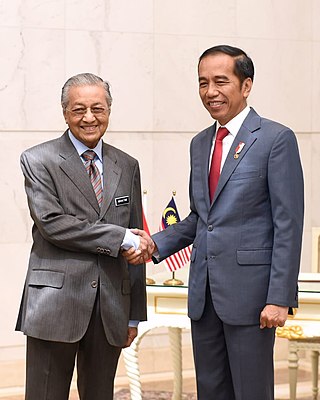
Since independence, Indonesian foreign relations have adhered to a "free and active" foreign policy, seeking to play a role in regional affairs commensurate with its size and location but avoiding involvement in conflicts among major powers. During the presidency of Sukarno, Indonesia's foreign relations were marked by engagement with other newly independent nations in Asia and Africa, as exemplified by the Bandung Conference, the subsequent foundation of the Non-Aligned Movement and a confrontational attitude towards Western powers, justified by a belief in the CONEFO and opposition to what Sukarno termed as NEKOLIM.

Relations between the European Union (EU) and the People's Republic of China (PRC) or Sino–European relations are bilateral relations that were established in 1975 between the PRC and the European Community. The EU is the PRC's largest trading partner, and the PRC is the EU's largest trade partner.
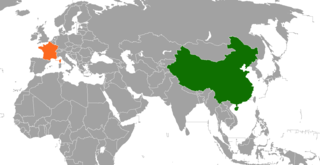
China–France relations, also known as Franco-Chinese relations or Sino-French relations, are the interstate relations between China and France.

Brazil–Russia relations have seen significant improvement in recent years, characterized by increased commercial trades and cooperation in military and technology segments. The two countries maintain important partnerships in areas such as space, military technologies, and telecommunications.

Diplomatic relations exist between Australia and France, as well as the historical contacts, shared values of democracy and human rights, substantial commercial links, and a keen interest in each other's culture.
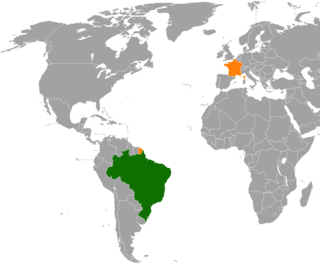
Brazil–France relations are the bilateral relations between the Federative Republic of Brazil and the French Republic.
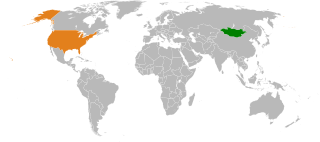
Mongolia–United States relations are bilateral relations between the United States and Mongolia.

Mongolia–Russia relations have been traditionally strong since the Communist era, when the Soviet Union supported the Mongolian People's Republic. Mongolia and Russia remain allies in the post-communist era. Russia has an embassy in Ulaanbaatar and two consulates general. Mongolia has an embassy in Moscow, three consulates general, and a branch in Yekaterinburg. Both countries are full members of the Organization for Security and Co-operation in Europe.

Mongolia–Vietnam relations are bilateral relations between Mongolia and Vietnam. Vietnam has an embassy in Ulaanbaatar. Mongolia has an embassy in Hanoi.

Sükhbaataryn Batbold is a prominent Mongolian political figure and leader, who was Prime Minister of Mongolia from 2009 to 2012, as well as Chairman of the Mongolian People's Party. He was previously Minister of Foreign Affairs in the government of his predecessor, Sanjaagiin Bayar.

Malaysia–Mongolia relations refers to bilateral foreign relations between Malaysia and Mongolia. Neither country has a resident ambassador. Malaysia has an honorary consulate in Ulaanbaatar, and Mongolia honorary consulate in Bangkok was accredited to Malaysia.

Bangladesh–France relations relate to the foreign relationship between Bangladesh and France.

France–Qatar relations are the bilateral relations between France and the Qatar. The first embassy to be established was the Qatari embassy in France in 1972, and the first bilateral agreement was signed in 1974. Qatar has marked various concurrences with France, covering all areas such as cultural, political, economical, academic, scientific and military agreements. The nations are tied in a key discourse protocol, where conversation over various issues of significance to the two capitals are occurring consistently.
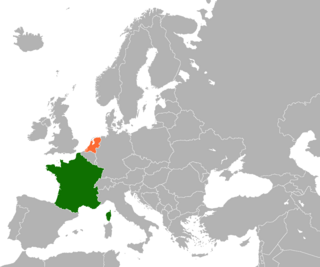
France–Netherlands relations are the interstate and bilateral relations between France and the Netherlands. The two countries notably share a border division in the Caribbean island of Saint Martin, to which the northern part of the island is a French overseas collectivity known as the Collectivity of Saint Martin, while the southern part of the island is a Dutch constituent country known as Sint Maarten. Relations between the two countries date back to the 17th and 18th centuries when a conflict led to the transformation of the Dutch Republic to the Batavian Republic and eventually the Kingdom of Holland. The two countries currently enjoy close cultural and economic relations. Both nations are members of the OECD and Organization for Security and Co-operation in Europe, as well as founding members of the European Union, NATO, and the United Nations.

Oyun-Erdene Luvsannamsrain is a Mongolian politician who has served as the prime minister of Mongolia since 27 January 2021. He has been elected to the State Great Khural (Parliament) twice since 2016. Prior to becoming the prime minister, Oyun-Erdene was a Minister and Chief of the Cabinet Secretariat of the government of Mongolia from 2 February 2019 to 27 January 2021.

Khaltmaagiin Battulga is a Mongolian politician and sambo wrestler who served as the 5th President of Mongolia from 2017 to 2021. He served as Member of the State Great Khural from 2004 to 2016 and Minister of Roads, Transportation, Construction and Urban Development from 2008 to 2012. Before his career in politics, Battulga was a sambo wrestling champion. He was the Democratic Party's candidate in the 2017 presidential election and was elected President with 50.6% in the run-off, the first-ever run-off election in modern Mongolian history. Mongolians are divided about his role in the 2019 Mongolian constitutional crisis.

France–Mongolia relations are the bilateral relations of France and Mongolia.

Presidential elections were held in Mongolia on 9 June 2021. The result was a victory for former prime minister Ukhnaagiin Khürelsükh of the Mongolian People's Party, who received 72% of the valid vote. The elections were considered free and fair by OSCE. However, there was controversy as several opposition candidates were disqualified and former president Khaltmaagiin Battulga was barred from running for a second term.

France–Taiwan relations are bilateral relations between France and Taiwan.
References
This article needs additional citations for verification .(April 2010) |
- 1 2 Fogarty, Philippa (10 September 2008). "Why Mongolia wants more neighbours". BBC News.
- ↑ "Mongolia president appeals to U.S. for trade to protect democracy". Reuters. 13 March 2018 – via mobile.reuters.com.
- ↑ "Page not found!". Times of Oman.
{{cite web}}: Cite uses generic title (help) - ↑ https://www.euronews.com/2018/03/13/mongolia-president-appeals-to-us-for-trade-to-protect-democracy [ dead link ]
- ↑ Lkhaajav, Bolor (2023-10-05). "US making 'third neighbor' moves on Mongolia". Asia Times. Retrieved 2024-05-16.
- ↑ House, The White (2023-08-03). "Joint Statement on the Strategic Third Neighbor Partnership between the United States of America and Mongolia". The White House. Retrieved 2024-05-16.
- ↑ "How Mongolia's Third Neighbor Policy Can Bolster Its Tourism Sector". thediplomat.com. Retrieved 2024-05-16.
- ↑ Lkhaajav, Bolor. "US-Mongolia 'Third Neighbor Trade Act' On The Way". thediplomat.com. Retrieved 2024-05-16.
- ↑ "Rep. Titus Announces the Introduction of the Mongolia Third Neighbor Trade Act". Congresswoman Dina Titus. 2023-11-30. Retrieved 2024-05-16.
- ↑ "French President Emmanuel Macron Makes a Historic Visit to Mongolia". thediplomat.com. Retrieved 2024-05-16.
- ↑ étrangères, Ministère de l'Europe et des Affaires. "France and Mongolia". France Diplomacy - Ministry for Europe and Foreign Affairs. Retrieved 2024-05-16.
- ↑ "What's Driving the France-Mongolia Rapprochement?". thediplomat.com. Retrieved 2024-05-16.
